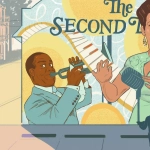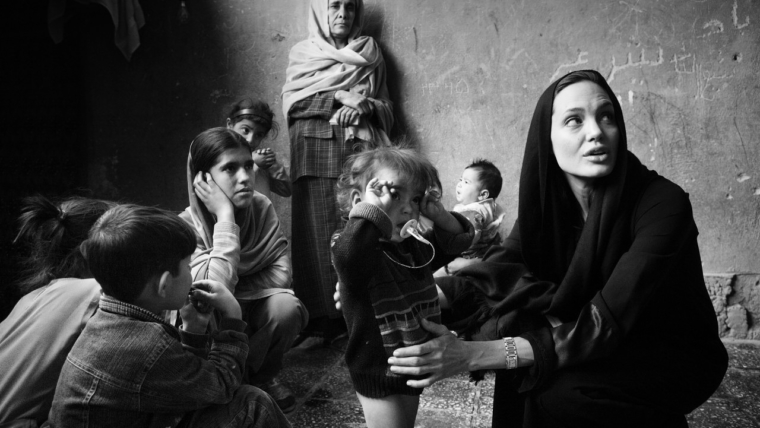
20 Black History and Culture Movies to Enjoy With Your Family
Share Black culture and history with the next generation by watching one of these family-friendly movies. They provide valuable insight while focusing on diverse representation.
It’s important to teach kids about Black history (and Black experiences) not just during Black History Month but throughout the entire year. One way to do that is by watching movies that showcase a spectrum of Black life. “Film is a visual medium that allows children to visualize historical figures and moments. When they are done well, films offer a great deal of context, giving children and families a three-dimensional understanding of Black history,” explains Aramide Tinubu, an expert film critic and culture writer for Netflix Tudum.
That said, it’s important for parents to acknowledge that Black experiences aren’t a monolith. Movies that center on slavery, the Civil Rights movement, and Black musicians can make a positive impression, but they should portray a diverse representation of Black life in simple, everyday roles as well. This means families should practice intentionality when choosing entertainment.
“When films are done well, they can offer a great deal of context, giving children and families a three-dimensional understanding of Black history,” says Tinubu. “Black history is American history. It’s imperative that we understand that our history did not begin with slavery.” She says narratives about enslaved people are an important component of the Black history canon—but diving into films like Hidden Figures and Black Panther can be just as powerful.
Here, we rounded up 20 movies that celebrate Black history and culture, with a focus on diverse representation. They’ll entertain your family while providing valuable education and insight.
Black History Movies for Kids (Ages 4-9)
Soul (2020)
Disney and Pixar’s Soul stars Jamie Foxx as Joe Gardner, a Black middle school band teacher who instructs music class by day but dreams of being a jazz musician by night. When famous jazz and blues singer Dorothea Williams (Angela Bassett) offers him the chance of a lifetime, he unknowingly sets out on a path that leads him to the “Great Before.” This changes the trajectory of his life, spiritually and emotionally. The themes in Soul transcend race; instead, the movie highlights universal themes of existence, purpose, mentorship, and humanity. Soul showcases the positive influence of arts education, and it opens the door for families to have heartfelt conversations about the human condition.
Dancing in the Light: Janet Collins Story (2015)
Narrated by actor and comedian Chris Rock, Dancing in the Light: The Janet Collins Story tells the story of ballerina Janet Collins and her journey to becoming the first Black woman to perform at the Metropolitan Opera House. The inspiring animated film highlights her hard work and perseverance—as well as the racism she faced throughout her career as a ballerina.
The Journey of Henry Box Brown (2008)
Narrated by veteran actress Alfre Woodard, The Journey of Henry Box Brown can introduce Black history to younger children. The animated short film is based on the true story of a man who escaped slavery by “shipping” himself to freedom in a wooden crate. It shares the struggles of enslaved people and their families, as well as Henry Brown’s harrowing 27-hour journey.
The Color of Friendship (2000)
The Color of Friendship follows a Black American girl and a white South African girl during the apartheid era in the 1970s. The movie gently addresses stereotypes, misconceptions around race, activism, and the power of friendship. Note that it includes some racial slurs that illustrate the racism of the time, but parents might think the message of compassion outweighs the language.
Garrett’s Gift (2008)
The 20-minute short film Garrett’s Gift shares the legacy of Garrett Morgan, the inventor of the traffic signal. Narrated by Queen Latifah, it demonstrates that wonderful things can come from unique ideas and it highlights the importance of finding out your “gifts.”
Black History Movies for Tweens (ages 9-13)
Crooklyn (1994)
Directed by Spike Lee, Crooklyn transparently depicts Black girlhood, the everyday life of a 1970s Black family living in Brooklyn, and the happenings of an overburdened Black matriarch. It gives an opportunity to discuss how family dynamics change depending on a person’s cultural or ethnic background, and it’s also refreshingly relatable. Crooklyn features some adult language, but the cultural nuance likely makes it worth the watch for older tweens.
Remember the Titans (2000)
Remember the Titans shares the true story of a Virginia high school football team in the early stages of integration. Starring Denzel Washington, the movie touches on segregation, integration, racism, and unity. It can be used as a motivational tool to foster a sense of camaraderie in sports or the classroom.
Hidden Figures (2016)
Hidden Figures is based on the real story of three Black female mathematicians: Katherine Johnson, Mary Jackson, and Dorothy Vaughan. It focuses on the role these history makers played in America’s race to beat Russia and send astronaut John Glenn to the moon. In addition to being a great motivational movie for tween girls and boys (especially those interested in STEM-based professions), Hidden Figures can also prompt discussions about sexism, workplace discrimination, teamwork, and unity.
The Great Debaters (2007)
Directed by Denzel Washington, The Great Debaters tells the story of Professor Melvin B. Tolson, an educator at Wiley College—a historically Black college in Texas—who inspired his students to form a debate team. Based on real life events in the 1930s, The Great Debaters depicts some of the unjust discrimination that these college students faced. Viewers appreciate the well-written screenplay and the multi-dimensional characters that don’t ascribe to common stereotypes.
Black Panther (2018)
One of the highest-earning films in the U.S, Black Panther is the first Marvel movie with a Black director (Ryan Coogler). It features a star-studded cast and many positive counter-stereotypes to the “victim” and “enslaved” tropes often seen in films highlighting Black life. Here’s a synopsis: In the technologically advanced African nation of Wakanda, T’Challa learns that his seat on the throne is being challenged and that the fate of Wakanda is at stake. With the help of the Wakandan special military, T’Challa (also known as the hero Black Panther) and others fight to save Wakanda. With exquisite costume and set design, and detailed and discerning creative direction, Black Panther beautifully depicts Black royalty, which is not often highlighted in film and television.
King Richard (2021)
Venus and Serena Williams have forever changed the sport of tennis. With their beaded braids, fashionable tennis outfits, and formidable skills on the court, they have made a mark on sports history that could never be erased. King Richard stars Will Smith as their father, Richard Williams, and shares how his unwavering belief, commitment, inner strength, and grit helped to cultivate two of the greatest female athletes alive today. While this movie touches on race, it also highlights the universal themes of diligence, strong mental fortitude, and determination.
Ruby Bridges (1998)
Directed by Euzhan Palcy, Ruby Bridges tells the story of 6-year-old Ruby Bridges, who was the first Black child to integrate her New Orleans school. The movie shows the racism and racial epithets that she endured, as well as the grace and inner strength that helped her through the process of integration. This movie has positive themes of heroism, courage, and the power of family and prayer.
Black History Movies for Teenagers (Ages 14+)
Drumline (2002)
In Drumline, starring Nick Cannon, a Harlem teenager is recruited by an intense band director. Viewers get a glimpse into college life in the South, the history of Black marching bands, and Black fraternities and sororities. Drumline also presents a spectrum of college students who come from diverse socioeconomic backgrounds. Your kids will learn about pride (and overcoming it), teamwork, and striving for excellence with a spirit of unity.
The Women of Brewster Place (1989)
Based on the book by Gloria Naylor, The Women of Brewster Place is a TV mini series that takes place in an inner city housing project building and its surrounding community. Produced by Oprah Winfrey’s Harpo Productions, it’s a raw depiction of life for several Black women at various time periods. All in all, it highlights the plight of many disenfranchised communities that experience the cyclical residue of systemic oppression.
Claudine (1974)
A 1970s romantic drama, Claudine depicts a love between two ordinary people, Claudine (Diahann Carroll) and Roop (James Earl Jones). Harlem-based Roop is immediately smitten with Claudine, a single Black mother of six kids, but life, responsibility, and financial pressure soon get in the way. Claudine is powerful because it shows two Black people who are flawed, just as they are: human beings needing and wanting love. With Roop, the movie definitely defies the angry Black man trope, and Claudine as a hard-working single mother challenges the racist myth of the “lazy single Black mom” stereotype. Overall, Claudine is relatable to many viewers, and it shines some light on the shortcomings within the American welfare system.
Rosewood (1997)
Starring Don Cheadle, Ving Rhames, and Jon Voight, Rosewood is based on real events of the Rosewood Massacre that happened in 1923, when a Black community in Rosewood, Florida was terrorized by a racist white mob and burned to the ground. This movie is recommended only for mature and older teens, as it depicts lynchings, gun violence, sex scenes, mobs, and racial violence. Rosewood also has themes of white allyship, and it could prompt discussions about the role that white allies, like Jon Voight’s character, played in the fight for social justice.
The Banker (2020)
Based on true events, The Banker follows the lives of two successful Black businessmen, Bernard Garrett and Joe Morris. They hired a white man to be the face of their growing real estate empire in the 1960s. History buffs and teenagers with an interest in investing, banking, and entrepreneurship will appreciate learning about America’s history of discrimination in these industries. Viewers will also learn about life for upper-middle-class Black people, and the sacrifices they had to make in order to have fair access to the “American dream.” This movie touches on racism, classism, housing discrimination, self-control, and perseverance.
Belle (2013)
Directed by Amma Asante, Belle follows the life of Dido Elizabeth Belle, the interracial daughter of Royal Navy Captain Sir John Lindsay, in the late 18th century. The period piece digs deep into social norms, social class, deep-seated racial bias, beauty, and so much more. If you love exquisite costume and set design, coupled with a well-written screenplay, Belle is definitely a must-watch movie.
Amistad (1997)
When a Spanish-owned ship with enslaved Mende captives is seized off the coast of Long Island, New York, it cause a major uproar when the U.S. courts must decide if the captives are slaves or free. Directed by Steven Spielberg, Amistad details the grueling journey that many enslaved people experienced during the transatlantic slave trade in the 19th century.
Selma (2014)
Directed by Ava DuVernay, Selma provides a great opportunity to discuss the fight for voting equality during the Civil Rights movement. This historical drama captures the marches from Selma to Montgomery, Alabama, in 1965—especially the role of Dr. Martin Luther King, Jr. Selma was nominated for Best Picture at the 87th Academy Awards and four Golden Globes.







